
- Knowledge is power
- The Future Of Possible
- Hibs and Ross County fans on final
- Tip of the day: That man again
- Hibs and Ross County fans on final
- Spieth in danger of missing cut
Tips On How to Keep Your Skin Hydrated
During summer, your skin becomes much drier because of the dry and harsh weather conditions, and you may experience dry patches or other skin problems such as acne flare-ups regularly. Take special care of your skin and keep it hydrated to protect it from the heat while keeping it healthy and glowing.
You can choose hundreds of products regarding skin care tips, and determining which is best for your skin type can feel like rocket science. People are frequently exhausted by their confusion, and as a result, they do nothing to care for their skin, resulting in damage.
Your entire face will glow when your skin is adequately hydrated. Hydrated skin is generally healthier, and it can help minimize the appearance of pores and balance out the general tone of your complexion.
What Is Skin Hydration
Skin hydration is moisturizing the skin to keep it soft and supple. Dehydrated skin feels tighter and duller, has more wrinkles, and may develop dark circles under the eyes. Dry skin can affect all skin types, so finding the right skincare products and techniques to keep your skin hydrated is critical. Miniaturization is frequently the last step in a skincare routine, but properly nourishing and hydrating skin requires more than a single step. You can protect against dryness and increase water retention with the right practices.
Causes of Dehydrated Skin
There are numerous reasons your skin may be dehydrated, including excessive travel, poor diet, or smoking. Stress in your life can significantly impact your skin because when your body is under stress, it produces more cortisol, which reduces your ability to retain water.
Importance of Hydrating Your Skin
Staying hydrated is the most important factor you can do for the health and appearance of your skin. People with dry, itchy, aging skin frequently do not drink sufficient water to keep their skin soft and healthy. The outer layer (epidermis), the underlying skin (dermis), and the subcutaneous tissue make up your skin. If the outermost layer of your skin lacks moisture, the skin loses elasticity and becomes rough.
Staying hydrated will rejuvenate your skin, making it smooth and soft. This is because the outermost layer of the skin contains the moisture required to remove toxins and transport important nutrients to the skin’s cells. Well-hydrated skin is also less sensitive to irritants and germs that can pass through the lipid barrier when dehydrated.
Skin that is dehydrated frequently becomes red, itchy, and flaky. Due to skin cell shrinkage, dry skin can exaggerate the appearance of fine lines and wrinkles.
Ways to Keep Your Skin Hydrated
Given below are several things you can do to keep your skin hydrated. Let’s take a closer look at the various methods listed below!
- Drink More Water
Water makes your skin soft and smooth. If getting at least the minimum amount of water is difficult for you, you can always attempt to include water-containing fruits and vegetables into your diet, such as watermelon, pineapple, or lettuce, or make smoothies with a variety of fruits and vegetables.
- Use Sunscreen
Perhaps you believe that you should only use sunscreen when on vacation or during the summer season. However, this is a common misconception. You should use sunscreen every day if you want to have glowing, radiant skin. Sunscreen helps reduce the risk of developing skin cancer. The sun depletes your skin’s hydration, elasticity, and softness.
- Properly Moisturize
Moisturize your skin as another summer skin care. Most individuals shy away from moisturizing because it makes them feel greasy. But suppose you don’t apply a moisturizer in hot weather. In that case, the moisture in your skin will quickly evaporate because of air conditioning or dry weather, leaving it dry, irritated, and prone to fine wrinkles. Oil glands, also known as sebaceous glands, secrete excessive amounts of oil during the summer, which promotes the growth of acne-causing bacteria.
- Add Avocado to your Diet
Your diet has a significant impact on the health of your skin. You can improve the health of your skin by including a variety of beneficial foods in your diet. Avocado is one of these beneficial dietary additions. When you eat avocados regularly, you can ensure that you are getting enough healthy fats in your diet. These natural fats can add moisture to the skin, significantly improving your skin condition.
- Use a Humidifier
Trying to add a humidifier to your home can provide numerous skin benefits. A humidifier helps to add extra humidity to the air, which can keep your skin from drying out. This is especially true during the winter when the air tends to be dryer. This is an extremely beneficial step to take when you have dehydrated skin.


